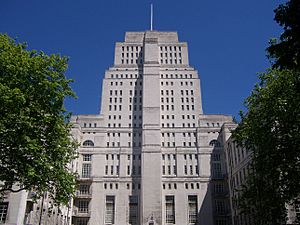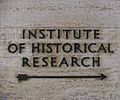Institute of Historical Research facts for kids
 |
|
| Founder(s) | A. F. Pollard |
|---|---|
| Established | 1921 |
| Director | Claire Langhamer |
| Members | 5,500 worldwide |
| Owner | School of Advanced Study, University of London |
| Location |
Senate House, Malet Street
,
,
|
| Coordinates | 51°31′16″N 0°7′43″W / 51.52111°N 0.12861°W |
The Institute of Historical Research (IHR) is a special place in London, UK. It helps people who study history, like students and professors. It's part of the University of London and is located in a big building called Senate House. The IHR gives historians the tools and training they need to learn about the past. It was started in 1921 by a historian named A. F. Pollard.
Contents
A Look Back: The IHR's Story
How It Started
The IHR was created in 1921 by a British historian named Albert Pollard. He became a professor in 1903 and soon realized that London needed a special school for people studying history after their first degree. In 1920, a kind person named Sir John Cecil Power gave a large sum of money, £20,000, to help make Pollard's dream come true. The Institute officially opened its doors on July 8, 1921.
The IHR was unique because it was managed directly by the University of London. It wasn't part of any smaller college. This new way of running things became a model for other institutes. Many of these later joined the IHR to form the School of Advanced Study at the University of London.
At first, the IHR was in "temporary" wooden huts on Malet Street. These huts were supposed to be temporary, but the IHR stayed there until 1947! Then, it moved into the north part of Senate House. This new building was designed by architect Charles Holden. It was a huge project, planned to cost £3 million and take 30 years to build. Today, many rooms at the IHR still look out over a grassy area.
World War II caused problems for the Institute. In September 1939, the war started, and the Ministry of Information took over Senate House. The IHR had to close in May 1940. Sadly, a bomb hit the IHR on September 22-23, 1940. This destroyed some books and almost all of their old maps of London.
Who Led the IHR?
Many important historians have led the IHR over the years. The first director was Professor Albert Frederick Pollard, who founded it. Today, the director is Professor Claire Langhamer.
What the IHR Does
The IHR has a big job! It aims to:
- Help people study history and understand why the past is important. This is for academics and the general public, in London, Britain, and all over the world.
- Offer many services to help with historical research, teaching, and learning in the UK. They do this through their library, talks, conferences, and publications.
- Support excellent research into specific parts of history through its special research centers. These include the Centre for Metropolitan History and the Victoria County History of England.
- Create a friendly place where historians can meet. People at all stages of their careers, from anywhere in the world, can come together to share ideas and learn about new historical discoveries.
IHR Activities
To achieve its goals, the IHR has many different activities and resources. These include a large library, a program of talks, and various research projects. They also publish historical research.
The Wohl Library
From the very beginning, the IHR wanted to combine learning with a great library. This tradition continues today, with many talks still happening right in the library rooms. The library has over 190,000 books! It collects materials for the history of Western Europe and areas that Europe influenced.
The library is especially good for local history in Britain and Europe. It has the largest collection of books about the Low Countries (like the Netherlands and Belgium) outside of that region. It also has a very complete collection of French cartularies (medieval books of legal documents) outside of France. You can also find a full set of the Victoria County History books here.
Many scholars have given their own book collections to the IHR library. In its early years, the library grew a lot by asking for donations. By 1926, three-quarters of its collection came from gifts from individuals and even governments from around the world. For example, a large part of the IHR's collection on colonial and early American history was given by the widow of George Louis Beer between 1921 and 1925.
Seminar Programme
The IHR hosts and supports many different seminars. These are like small classes or talks where people discuss specific history topics. Anyone interested can attend! The topics cover a huge range, from the Early Middle Ages to Modern Britain, and even the history of gardening.
Conferences
The IHR also helps organize and run conferences and workshops. These are bigger events where historians share their research. They have an annual conference on a different historical theme each year.
British History Online
The IHR helps manage British History Online. This is a digital library full of important historical documents and books about the history of Britain and Ireland. It mainly focuses on the years between 1300 and 1800. It's a great resource for anyone wanting to explore British history!
Historical Research Journal
|
Former names
|
Bulletin of the Institute of Historical Research |
|---|---|
|
Abbreviated title (ISO 4)
|
Hist. Res. |
| Discipline | History |
| Language | English |
| Edited by | Lawrence Goldman |
| Publication details | |
| Publisher |
Institute of Historical Research (UK)
|
| Frequency | Quarterly |
| Indexing | |
| ISSN | 1468-2281 |
| Links | |
|
|
The IHR publishes its own scholarly history magazine called Historical Research. It first came out in 1923 with a different name, Bulletin of the Institute of Historical Research. It changed to its current name in 1987.
Reviews in History
The IHR also publishes an online journal called Reviews in History. This journal started in 1996. It publishes reviews and new looks at important historical works in all areas of history.
Layers of London
The Layers of London project is a cool online tool. It brings together old maps, photos, and other information about London's history. This information comes from places like the British Library and London Metropolitan Archives. The website lets you explore different "layers" of London's past, from Roman times to today. It has over 11,500 records, many of which are added by users!
Marc Fitch Lectures
The IHR hosts special talks called the Marc Fitch Lectures. These talks used to be held only at the Institute. But since 2012, they travel around different counties, with three talks planned each year. Famous historians like Linda Colley and Michael Wood have given these lectures.
Humanities Digital Library
The IHR is leading a project to make research publications available for free online. This led to the creation of the Humanities Digital Library. It's a catalog of free-to-read books published by the School of Advanced Study. They also have a free book series for new historians, working with the Royal Historical Society.
Special Research Centres
The IHR also includes two special research centers:
- The Victoria County History, which writes detailed histories of each county in England.
- The Centre for Metropolitan History, which focuses on the history of cities, especially London.
The IHR used to have a third center, but it moved to King's College London in 2010.
See also
- Historical Association
- Royal Historical Society
- Historiography of the United Kingdom
 | Sharif Bey |
 | Hale Woodruff |
 | Richmond Barthé |
 | Purvis Young |






